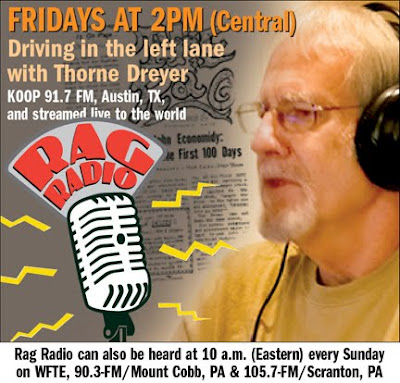Bruce Melton : Welcome to Climate Change in Texas
Drought and wildfires:
Welcome to climate change in Texas
By Bruce Melton / The Rag Blog / December 29, 2011
Environmental researcher and climate change activist Bruce Melton will be Thorne Dreyer's guest on Rag Radio, Friday, Dec. 30, from 2-3 p.m. (CST), on KOOP 91.7-FM in Austin and streamed live on the web. (The show is rebroadcast on Sundays at 10 a.m. [Eastern] on WFTE, 90.3-FM in Mt. Cobb, PA, and 105.7-FM in Scranton, PA.) Also, listen to our Dec. 12, 2010, interview with Bruce Melton at the Internet Archive, and read more articles by Bruce Melton about global warming on The Rag Blog.[This is the first in a three-part series.]
AUSTIN -- If this is not climate change, then this is exactly what climate change will be in as little as a decade. What has been happening in Texas, with these unprecedented (in time frames that matter) droughts and wildfires, is exactly what the climate scientists have been warning us about for over 20 years. We have been building up to this point since about the turn of the century, and now ecosystems have tipped over the edge. Climate feedbacks have kicked in hard.
The Texas Forest Services tells us that a half billion trees have died. Many more will die in the next five to 10 years from disease and insect infestation allowed by the damage that has already been done. These are the trees that have died in the drought, not the fires.
The first of this series of drought in 2005/6 was just classified as extreme. The last two have been one category worse than extreme -- the exceptional category. The last 12 months were drier than the worst 12 months of the great drought of the 1950s. This has been a $10 billion drought, with another $1 billion in damages from the fires.
Worse, it’s hotter now. This summer was 4.9 degrees warmer than average. This may not seem like a lot, but think how sick you have been in the past if you have ever had a 102.9 degree temperature. The reason that increased heat makes such a big difference is that extra heat greatly increases evaporation intensifying the effects of drought. In other words, the same drought is much worse if it is only a little hotter.
Trees started dying from the drought in 2005/6. The die-off became really bad in 2009 when broad swaths of the countryside west and east of Austin turned brown and failed to turn green again in the spring. Trees damaged from just one of these droughts can remain weak and susceptible to disease or dieback for a decade or more after the drought. The little root hairs on tree roots that soak up water take a long time to grow back.
West of Fredricksburg for 100 miles to the edge of the forest the desert has arrived. Fully half of the trees in that region are defoliated from drought (only a small amount is from oak wilt). The fate of many of these trees is sealed, but there is hope that rain will return fast enough to make a difference for some.
The total number of fires in Texas since November 2010 (through September 20, 2011) is 22,790, totaling 3,759,331 acres. This exceeds the previous record of 2.1 million acres, set in just 2005/6, by 80 percent. We almost doubled the last record, set just five years ago.
Thirty-three percent of U.S. wildland fires this year have been in Texas. The number of Texas fires this year is 61 percent greater (so far) than the 10-year national average for the entire United States. Six of the 10 largest wildfires in Texas history have occurred in 2011.
Sure, there have been bigger droughts and bigger fires in the early 1900s or the 1800s or the 1,300 hundreds or 3,000 year BC, but our complicated society did not evolve back then. We do not have the water to support our region today. This is why we have water use restriction in effect now, and last summer and every summer since the turn of the 21st century.
Do those bigger droughts in the past matter? Not one bit unless one uses that knowledge to understand the droughts and other really serious impacts allowed by drought that will happen right here, starting now. This is exactly what our climate scientists have been doing for these last 20 or 30 years that they have been warning us that these things would become the normal on a warmer planet.
In June 2009, the U.S. Global Change Research Program (USGCRP), founded by Ronald Reagan, published a report that tells us that by 2080, Austin will see an average of 90 to 120 days of 100 degree weather every year -- 10 times more than today’s average of 12 days per year. And this evaluation was done based on one of the middle of the road scenarios.
We are currently smack-dab in the middle of the worst-case scenario of the climate models. FYI: the Sonoran Desert Research Station in Arizona, the one with the giant Saguaro cactus, has an average of 87 days every year where the temperature tops 100 degrees.
A paper in Geophysical Research Letters in July 2010 (Diffenbaugh and Ashfaq) tells us that climate conditions will continue to rapidly worsen in the interior of North America and especially the West. The worsening will be so rapid that the decade 2020 to 2029 will include three to five droughts as bad as or worse than the worst drought that we have seen since 1951 (like what we just had).
A report out of the National Climatic Data Center in February 2011 (Dia) tells us that beginning in just 19 years (2030) Dust Bowl conditions will be the average climate condition across much of the interior of the U.S. By 2060, much of the interior of the nation will be two to three times as bad as the Dust Bowl with some areas four to five times more extreme than the Dust Bowl.
If you think I am trying to scare you, you are wrong. Projecting the second year of this current drought similar to or worse than what we have just experienced, with a growing La Nina and Lake Travis at 38 percent of capacity right now -- that’s scary.
Lake Travis was 100 percent full just 16 months ago. Travis is at its third lowest level or as low as it has been in 47 years. The only reason that it is not the lowest level ever though, is that prior to 47 years ago Lake Travis was used extensively for hydropower generation. This has not been done since that time.
What are we gonna do? Getting through the drought and fires is very important. This situation is extremely dangerous. Trim your trees, police your underbrush, move that firewood pile away from the house, get your valuables together in a “go-bag.”
The threat of suburban and even urban firestorms, as demonstrated recently in Bastrop and accidentally predicted, to the weekend -- by our State Climatologist -- is real and it is not likely to get better for another year. The future is here now. We must change the evolution of our society fast, before we run completely out of water. Prehistory tells us that these abrupt climate changes can be exceedingly violent.
This is no longer business as usual. Water use restrictions will not meet this challenge alone. We must act now to convince our leaders that this is not just another in a long string of extraordinary weather events that we cannot yet blame on climate change. If we do not immediately change our habits and lifestyles, we will run out of water. Our forests are already dying because they have run out of water.
Now: if you have read this far, you deserve a break. The bigger picture is a little more comforting than what is happening in our region today. I just finished another book by Dr. Richard Alley, one of the pivotal climate scientists of our time. Professor Alley tells us in Earth, the Operators Manual, that fixing our climate will be no more difficult or costly than creating our society’s wastewater collection and treatment infrastructure.
Cleaning up human waste took about 100 years and so will fixing our climate. It took about one percent of global GDP to install our wastewater infrastructure and this is close enough to the latest economic analyses of dealing with climate change to make the comparison valid. One percent of global GDP is almost exactly the same amount of money as the U.S. spends on its military every year, not counting wars.
But please understand that our climate scientists have been warning us for more than 20 years that if we do not act now, the costs and impacts will only become greater.
[Bruce Melton is a professional engineer, environmental researcher, filmmaker, writer, and front man for the band Climate Change. Information on Melton’s new book, Climate Discovery Chronicles, can be found, along with more climate change writing and outreach, critical environmental issue films, and the band’s original blues, rock, and folk music tuned to climate change lyrics at his website. Read more articles by Bruce Melton on The Rag Blog.]
References:
A half billion trees:
Preliminary estimates show hundreds of millions of trees killed by 2011 drought, Texas Forest Service, December 19, 2011.
http://txforestservice.tamu.edu/main/default.aspx?dept=news
The Texas drought and future of drought in Texas:
Snapshot of the Texas Drought: Near-term and long-term, projections include more dry conditions in Texas, Texas Climate News, Houston Advanced Research Center, November 2011.
http://texasclimatenews.org/wp/?p=3548
Drought in Texas: Status, Future, Reinsurance, Willis Re, 2011.
http://www.willisre.com/documents/publications/Risk_Financing_Structuring/Resource/Property/TexasDrought_2011.pdf
August 2011 Weather Summary: National Climatic Data Center, National Oceanic and Atmospheric Administration:
http://www.ncdc.noaa.gov/sotc/national/2011/8
Billion dollar U.S. weather disasters 2011, National Climatic Data Center:
http://www.ncdc.noaa.gov/oa/reports/billionz.html
USGCRP, U.S. Climate Change Science Program Coastal Sensitivity to Sea Level Rise: A Focus on the Mid-Atlantic Region, U.S. Geological Survey, Environmental Protection Agency, National Oceanic and Atmospheric Administration and Department of Transportation, 320 pages, November 2009.
Complete report available online: http://www.globalchange.gov/publications/reports/scientific-assessments/saps/302
Diffenbaugh and Ashfaq, Intensification of hot extremes in the United States, Geophysical Research Letters, August 2010. http://www.stanford.edu/~omramom/Diffenbaugh_GRL_10.pdf
Dai, Drought under global warming - a review, Wiley Interdisciplinary Reviews - Climate Change, p 45-65, January-February 2011.
http://onlinelibrary.wiley.com/doi/10.1002/wcc.81/pdf
Alley, Earth: The Operators Manual, WW Norton, 2011
The Rag Blog




















